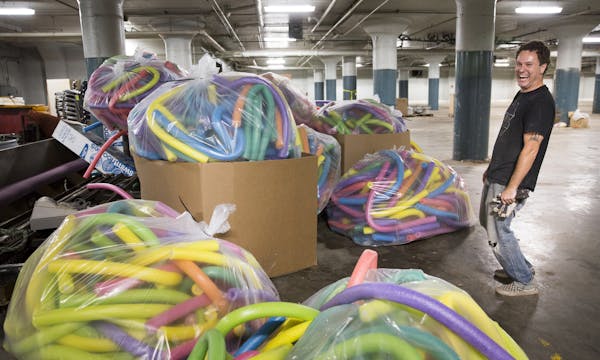Dusty Thune is a special-education teacher and artist who has a way with awesome ideas, so when it came time to fund his latest project, he turned to the Awesome Foundation.
The group offers grants that are small — no more than $1,000 — but in Thune's case, it's helped to create something big, loud and ambitiously ridiculous.
This weekend, Thune and a bleary-eyed crew raced to finish an indoor mini-golf hole consisting of a 26-foot-tall, hot-pink mastodon in a hot tub. This is no easy putt into a clown's mouth. It's sensory overload at the 10th hole of the long-awaited Can Can Wonderland course opening Thursday in St. Paul's Midway area.
According to its website, the Awesome Foundation is a "global community advancing the interest of awesome in the universe, $1,000 at a time." It has loosely run chapters worldwide that define what awesome means locally. For the Twin Cities group, it's about ideas that are a "little sparkly ... a little goofy," said its dean, Karen Cooper.
Foundation trustees bankroll the grants out of their own pockets. In December, the Twin Cities chapter — there is also a separate chapter in north Minneapolis — agreed to provide $1,000 for a snowblower ballet being planned by St. Paul Pioneer Press reporter Richard Chin and for "Light Up Lake Street" lantern-making workshops proposed by In the Heart of the Beast Puppet and Mask Theatre in Minneapolis.
The grants also have put a spotlight on teachers like Thune, who are skilled at drawing the best out of their students — even if it means the kids get their hands dirty. Twin Cities trustees decided last month to give $200 to Terese Fuentes, a teacher at St. Paul's Wellstone Elementary, so she can begin storing worms in her classroom for a composting project.
Cooper said the group recognized that kids like worms, they like dirt, they like "icky," and agreed: "It's $200, let's just do it." The trustees put Fuentes on a speaker phone. To their surprise, she began crying. She had just had a difficult day.
"You made me realize that my work is valuable," she said.
Said Cooper: "We felt that was the best 200 bucks that we've spent."
Psychedelic fun
Can Can Wonderland is an 18-hole mini-golf course designed and built by local artists. Once envisioned for an outdoor site near the Schmidt Artist Lofts on W. 7th Street, it now occupies part of the former American Can Factory at 755 Prior Av. N. between University Avenue and Pierce Butler Route.
To create his hole, Thune received $5,000 from Can Can — plenty for a cool experience, he said, but not for the kind of "knock your socks off right from the bat" jolt that an additional $1,000 could provide. Making a massive mastodon shake, light up, scream — "all that fun stuff," he said — would have been difficult without foundation assistance.
Thune, as a kid, was an adventurer, sneaking where he shouldn't, for example, to see how robots worked at Chuck E. Cheese's. Now 37, he has captured local and national snow sculpting awards, one for a "Hot Tub Time Machine" design that included a mastodon with windswept fur.
But it is as a special-education teacher working with young adults at Focus Beyond Transition Services that he has made perhaps his biggest mark. If students have a desire to do more than fold laundry or clean windows after high school, he encourages and helps them go for it. He has organized film projects starring his students, and showcased the work at a red-carpet event at the Ordway Center for the Performing Arts.
One of his Focus Beyond students, Rick Tschida, 23, of St. Paul, now is displaying his talents as the man behind the mastodon's movements. Tschida has Asperger's syndrome, which he said means he has difficulty reading social cues but possesses the focus, passion and technical acumen to have been a robotics team member at Highland Park Senior High for four years.
Thune, he said, "changed my life. I went from playing video games in the basement to [programming] something like this: a big pink acid trip." Assisting him with the robotics work — literally in the belly of the beast — has been Tom Carney, an educational assistant at Focus Beyond, who has cerebral palsy.
Cooper said she is excited to see the final product.
Thune has promoted other ideas to the Awesome Foundation, too, and trustees could see another in the near future. Thune said that he plans to have his Focus Beyond students test the mini-golf course for its compatibility with Americans with Disabilities Act (ADA) requirements. A new 3-D printer might come in handy, he said, if one had a need or desire to create adaptive equipment for mini-golf fun.
Anthony Lonetree • 612-673-4109
Hopkins parents charged in 9-year-old daughter's deadly asthma attack

Back to blue: Lake Harriet Band Shell renovation almost finished

What St. Paul gardeners need to know about the city's new boulevard garden rules

